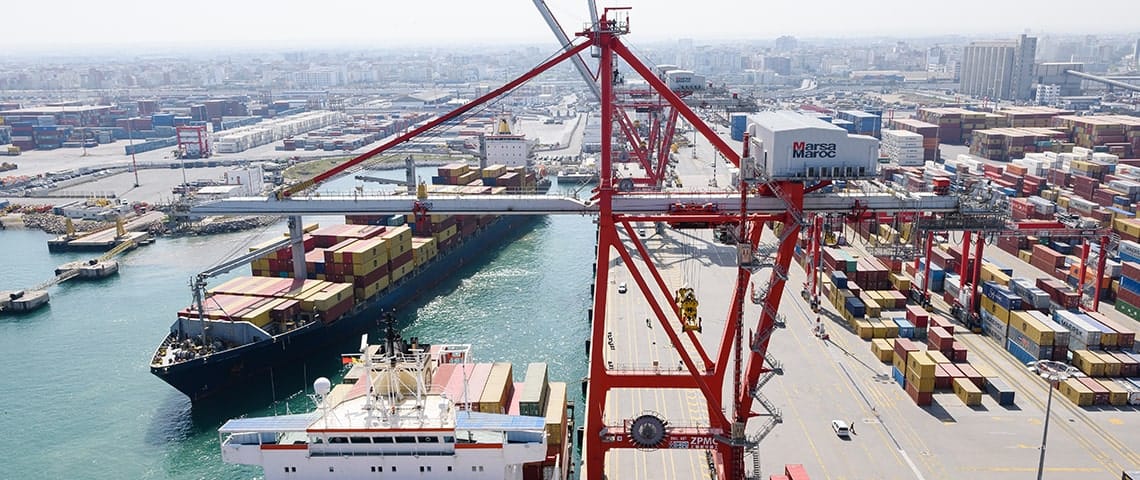
In a globalized economic context, the role of freight forwarders has become essential to ensure the smooth running of international trade. In Morocco, where foreign trade is experiencing constant growth, choosing the right freight forwarder can make all the difference in optimizing your logistics operations. This article details the essential steps and criteria for finding the best freight forwarder to meet your needs.
What is a freight forwarder and why is it crucial for your business?
A freight forwarder is a logistics intermediary that manages the transportation of goods between the point of origin and the final destination. It plays a key role in organizing, coordinating and supervising all stages of the supply chain: multimodal transport, customs clearance, warehousing and delivery.
Why collaborate with a freight forwarder in Morocco?
- Local expertise : In-depth knowledge of Moroccan customs regulations.
- Access to key infrastructure : Ports such as Tangier Med and Casablanca, international airports, and strategic road networks.
- Reduced costs and time : Optimizing processes to minimize delays and additional costs.
1. Analyze your specific logistics needs
Before you begin your search, clearly define your needs:
- Nature of the goods : Dangerous, perishable or high-value products require specific skills.
- Shipping volume and frequency : This determines whether you need regular or one-off service.
- Destinations : Choose a freight forwarder who understands the routes and procedures to your target markets.
2. Evaluate the freight forwarder’s experience and expertise
A good freight forwarder stands out for their experience in your industry and their ability to handle complex shipments. Make sure they have:
- Expertise in Moroccan customs regulations.
- An understanding of international markets, particularly those in which you operate.
- Years of proven experience in transporting goods similar to yours.
3. Review the services offered
A full-service freight forwarder should offer a range of services tailored to your needs:
- Multimodal transport : Combination of air, sea and land freight for maximum flexibility.
- Customs management : Assistance with administrative formalities to avoid delays.
- Warehousing and distribution : Secure storage solutions and fast delivery.
- Cargo insurance : Protection against risks during transport.
4. Check certifications and accreditations
A reliable freight forwarder should have the necessary accreditations, such as:
- OEA (Authorized Economic Operator) : Ensures compliance with international safety and transparency standards.
- ISO 9001 : Ensures high standards in quality management.
5. Check references and customer reviews
Don't hesitate to ask for references or read customer testimonials online. Ask questions about:
- The responsiveness of customer service.
- Respect for deadlines.
- Managing unforeseen events (e.g. customs delays or weather conditions).
6. Check the international partner network
A freight forwarder with a well-established global network is a major asset for your international operations. Check if they work with:
- Reputable shipping companies.
- Reliable air carriers.
- Strategically located warehouses.
7. Analyze price transparency
Logistics costs can quickly add up if hidden fees appear. Make sure the freight forwarder provides you with a detailed quote that includes:
- Shipping costs.
- Customs duties.
- Insurance and handling costs.
8. Evaluate communication and responsiveness
A good freight forwarder should:
- Provide regular updates on the status of your shipments.
- Respond quickly to your questions or concerns.
- Be reachable in case of emergency, whatever the time.
9. Ensure flexibility and adaptability
Your business may face unforeseen challenges, such as a sudden increase in demand or disruptions in the supply chain. A flexible and innovative freight forwarder can offer tailor-made solutions to adapt to these situations.
10. Compare multiple freight forwarders
Don’t limit yourself to just one provider. Request quotes and analyze proposals from multiple freight forwarders. Compare them on:
- The quality of services.
- The guarantees offered.
- Value for money.
Conclusion
Choosing the best freight forwarder in Morocco is a strategic decision that can transform your logistics operations. By taking into account your specific needs, the provider's experience, the quality of services and price transparency, you can find a reliable partner to facilitate your international trade.
FAQs about freight forwarders in Morocco
What documents are required to work with a freight forwarder in Morocco?
You will need commercial invoices, packing lists, certificates of origin, and specific permits depending on the type of goods.Can a freight forwarder handle urgent shipments?
Yes, many freight forwarders offer express services for urgent shipments.Is it possible to change freight forwarder during the operation?
This can be complex but still doable, depending on the progress of your shipment.




